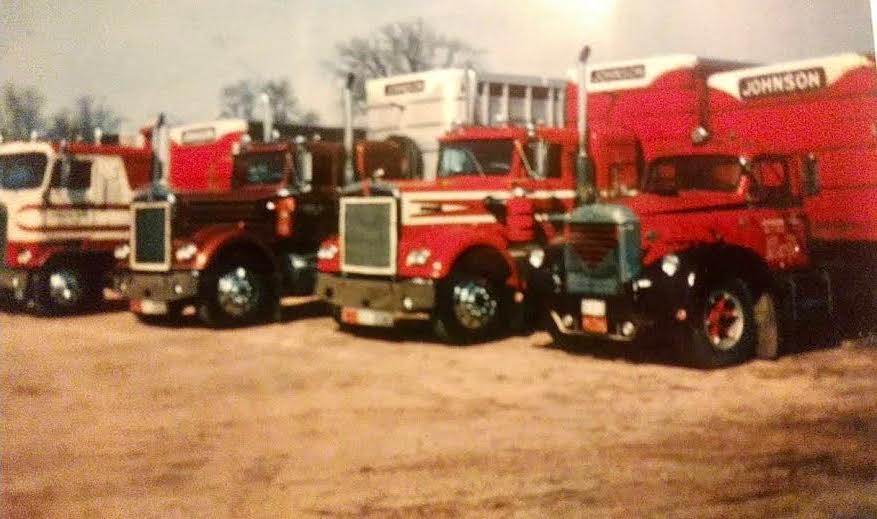Recently, we returned to the fishing hole up north. The “spawn” was imminent. The promise of big 12-inch crappies was uppermost in our thoughts. It was mid-May, but the weather had been nice so we took a chance. Unfortunately, it was probably the worst weather we have ever encountered in all of our years of Chetek, Wisconsin, fishing. It stormed three days in a row while we sat in our cabin reading books. It’s a good thing we like to read because it wiled away the time. The fourth day promised success; the sun was shining on the lake. One lousy perch, not even big enough to fillet. So we packed up and came home. As I write this, the Gruhn boys are back up north again slamming the crappies. That’s a good thing. My fishermen are “do or die.” Hope springs eternal.
The drive is always interesting from the passenger seat. We don’t have to drive long or far to get into north woods country. My interest was not in the majestic tall pines, but rather the hundreds and hundreds of semis hurrying along. Honestly, I’ve never seen so many heading north or south. When the kids were little, we used to count bass boats, pontoons, then Volkswagens, American flags, or brown cows. We needed lots of diversions to keep the kids from fighting. I daresay counting semis on this trip would have necessitated using the calculator on my phone. Pretty amazing.
This column is not going to be about semis in Wisconsin, but rather it is devoted to Miles, Iowa’s, very own Johnson Brothers and their red semis. Recently, Marvin Johnson, aka Marvie, passed on at the age of 94. I was able to visit with his family during this time of remembrance. In my heart, I saluted the old veteran in his Korean War cap and flag-draped coffin. He was a proud and ever-loyal-American. How we will miss the passing of these Americans who fought in past wars and came back to our communities. My fondest memories are when I was a little girl. I watched Elmer and Marv Johnson herd angus steers out of our cattle yard into the big red trucks. From there, they headed to the stockyards in Chicago, the place where Midwest cattle farmers hoped for the best price.
When I was an English teacher in the middle school classroom, I always showed my students how to write essays. In teacher language it was called ‘modeling.’ On my overhead projector I wrote my own descriptive essay, showing students how I organized my thoughts, wrote introductions and conclusions, etc. (At the time, one of Elmer Johnson’s grandsons sat in front of me. Later I taught Marv’s grandchildren, as well.) That day, I picked a topic most kids could write about which was “wheels.” From bikes to cars to pickups to semis, any student could have a memory involving wheels.
The many relatives of the Johnson Boys got a hold of my piece from their kids who were asked to write their own “wheels” essay. That was maybe 30-40 years ago. Lo and behold, at Marvin’s wake, there was the “Wheels” essay lying on the memory table. I had lost the essay I wrote, but the Johnson family had saved it. I reproduced it today in honor of the Johnson Brothers, Elmer and Marv, who drove those big red semis up the lane, into our yard. What a great legacy of hard work they have left to their community. Here is the piece entitled “WHEELS.”
“…When I think of wheels, I think of those huge moving machines that run day and night across the interstates of our country. And those thoughts take me back lots of years to the beginning of my first acquaintance with semi trucks. Elmer and Marv were the Johnson boys as my dad called them. I remember the big red trucks pulling into the yard all snorting and roaring like a huge chained beast. My sister and I could only watch from the bathroom window as the cattle were loaded for Chicago. We had to stay out of the way so the men could do their work. Whips, hip boots, cigarettes hanging out of the corners of their mouths, these were Midwestern cowboys. They whistled, prodded and cussed the fat slick angus steers up the loading shoots and into the latticed semi-trailer. Even the smell, strong of hay and manure, was not unpleasant. It meant men, action, animals, and as my dad always said, “money.”
There was excitement and tension in the house because Dad would be gone to the Chicago stockyards for three days to sell the animals. When my dad got home, my sister and I are always thrilled to hear the stories of the ride in the semi, the big city life, and the rough characters who stayed at the Stockyard Inn. It was always a good time because he came home with a cattle check in his hand. That’s what our life was like back then when farmers thrived on selling beef, I can’t see those proud red trucks in Miles today that say ‘Johnson Trucking’ without recalling the boys who are now grandpas to students that sit in desks in my front row.’
Thank you Johnson family for sharing this with me. Glad I could bring back the memory.


